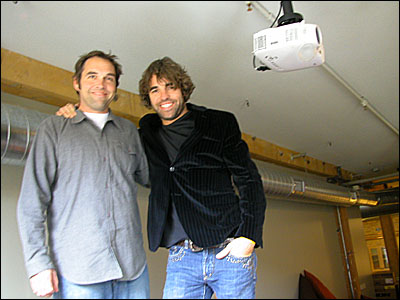|
We Are the Web
by Sasha Aslanian
 Riley Kane and Bill Jurewicz of Space150 produced "We Are the Web," a viral video featuring Internet celebrities singing and dancing in support of Net neutrality.
Photo by Sasha Aslanian "We Are the Web" was produced by Space150, a digital ad agency based in Minneapolis. Agency president Bill Jurewicz and Associate Creative Director Riley Kane wanted to produce a video to help the Net neutrality cause, and get some exposure for their agency at the same time.
They got the idea in early 2006. Kane had been receiving emails from MoveOn.org urging him to support Net neutrality, but he thought the message was kind of dry and boring. The ad man decided to tap the creativity of the medium to help the cause. "We wanted to take what was a serious issue which is really changing the Internet as we know it now and just put a comedic spin to it," said Kane. He decided to play off the "We Are the World" benefit concerts of the 1980s.
The Internet Was a Platform For Their Artistry
Listen
Riley Kane: But our celebrities that we organized were people that were Internet celebrities, people that became famous almost overnight over the Internet, these cult people. I remember getting sent the Peter Pan site a couple years ago. We just started making a list and started calling people. Luckily, we got our three favorites. It was the Tron guy, Peter Pan and Lesley Hall, the gem sweater lady, so we started there and just ... basically got everyone together and recorded this music video. We wrote the song and came up with the music and it was just a pretty crazy shoot. I mean these people are very eccentric people and they all, you'll see in the video, they all three have tights; they're all wearing tights. They're all really throwing it out there and all very serious about what they do so the Internet was a platform for their artistry, to get their message out, whether it's, "I made a Tron costume," or "I love gem sweaters," or "I think I'm Peter Pan."
Bill Jurowicz: It's really interesting to even see the throwback of almost nostalgia on something digital now. I mean when you take a look at the things that were created in the late '90s, early 2000s, and we can actually throw back almost ... like seeing old retro commercials or something, like we did from the '70s or '80s or something. Now we can start throwing back the dancing baby, for example, we threw in there. Some of these like the cat with the guitar, these two Asian kids who are with Houston Rockets jerseys, as almost a tip-off of look at the revolution of material in entertainment that you've been exposed to that we almost grabbed it from the back of your mind and put it out there. ... The beauty of that or the magic of that can still live on or it might be restricted. That's the big message. This is the revolution that's happening. Why stop this? Why change it just because of some big corporate policies, especially on a medium based on the World Wide Web which is world wide for that very reason and its not the United States Internet.
Kane: And I think in the words of the Tron guy, which he says in kind of testimonial, he says, "I was anonymous, but I will no longer be anonymous." Through the Internet, he became ... he was just a regular computer programmer guy and it just vaulted him to this personality and he was on Jimmy Kimmel and like these people have actually crossed over to, you've seen them on David Letterman and Conan O'Brian.
Jurowicz: And isn't the world a better place now that we have the Tron guy exposed in our lives?
Kane: Absolutely. Absolutely. I absolutely believe that, actually.
Jurowicz says Space150 invested $20,000 to make the video but it earned valuable PR for the agency. Bloggers passed it around, Yahoo's home page linked to it, thousands of people watched it on YouTube and VH1 picked it up. "A lot of people are trying to make everything go viral, but it's a very strange combination to really hit a home run," says Jurowicz.
For Kane, it was fun to produce something that took on a life of its own. "It's one of those things that I've always wanted to work on where you can be in a group of people and can throw it out there and people can say, 'Oh yeah, I heard about that,'" he says. Kane admits the song is "sticky." You can't get it out of your head. I'm the Internet, you're the Internet.
Back to Imperial Washington
|



